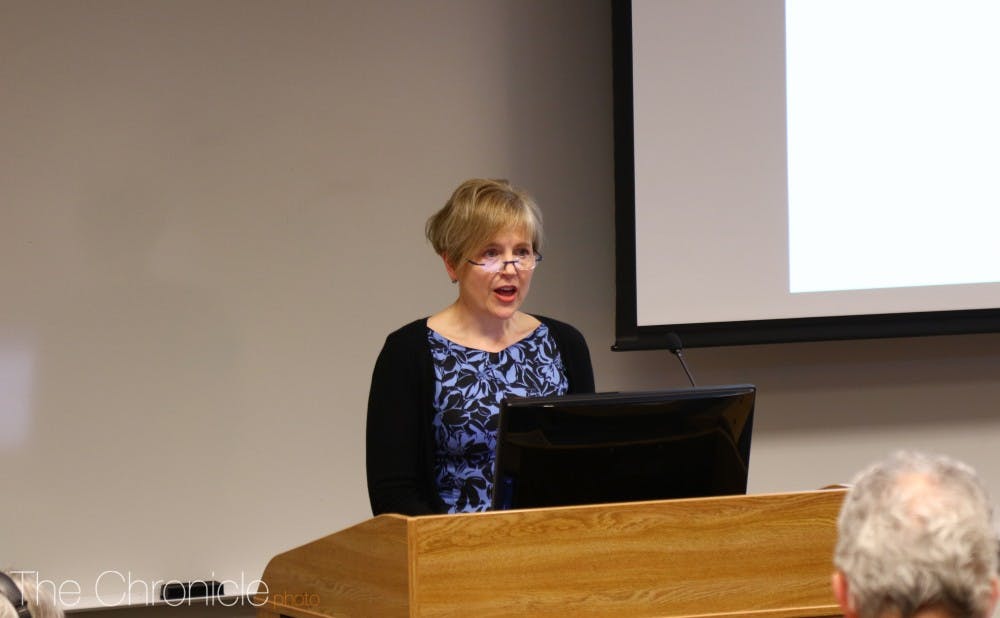Hot for your professor? Faculty-student relationships may no longer be permitted because of a new policy discussed by Academic Council Thursday.
The proposed amendment to the Faculty Handbook prohibits all undergraduate-faculty sexual and romantic relationships and limits relationships between faculty and graduate students to circumstances where the faculty member does not have supervisory roles over the student. Violations may result in sanctions for the faculty member, which may include counseling, suspension, demotion or termination.
“This didn’t pop out of the sky,” said Don Taylor, chair of Academic Council, explaining the proposed policy. “We talked about this a lot, and there are a lot of stakeholders in this.”
The current policy governing faculty-student relationships only bans consensual relationships between faculty and students—graduate or undergraduate—if the faculty is in any sort of "situation of authority" over the student—as an advisor, professor or otherwise. It also has no listed penalties other than "terminating the situation of authority," meaning that the student would switch advisors or classes.
Under the new policy, termination would not be a required penalty for consensual relationships, but would be an allowed penalty. Supervising deans would determine the outcome. Under the proposed policy, relationships between faculty and graduate students would not have to be reported if they are in different schools of the University. If they are in the same school but not in supervisory roles, they would have to be reported.
The new policy also covers students in academic roles as teaching assistants or graders.
“That policy is not as punitive,” Taylor said. “It’s more of what I would call a harm-reduction policy."
Faculty were generally supportive of the policy but had some questions about how it would work in practice.
Joshua Sosin, associate professor of classical studies, noted that graduate students may be more vulnerable than undergraduates. Even if significant others are required to be from separate parts of the University, the increasing role of interdisciplinary collaboration may make that confusing.
“Undergraduates are not exactly adults,” said Elizabeth Ananat, associate professor of public policy. “They are adults for some purposes but are not adults for a lot of other legal purposes. Most of them can’t drink and developmentally, most psychologists think they are not in a position developmentally necessarily to fully consent to a sexual relationship with someone who is a full adult and also potentially in a position of power.”
Taylor noted that the proposed policy is similar to policies implemented recently by Stanford University and the Massachusetts Institute of Technology. One difference in Duke's proposed policy is that a faculty member with a past relationship with a student is precluded from having future authority roles over them.
Academic Council will vote on the policy at its May 10 meeting.
In other business:
The Council heard two proposals for new degrees. Lesley Curtis, chair of the department of population health sciences, presented a proposal for a Master’s and Ph.D. program in population health sciences.
Population health studies the factors that influence the health of large populations and policies to improve health. The program would combine courses in epidemiology, measurement science, analytic methods and implementation science.
The department currently has 34 faculty members with primary appointments and will expand over the next several years. Under the proposal, the Master’s degree would launch in Fall 2019 with a Ph.D. program beginning in Fall 2021.
In response to questions about how the degree would be distinguishable from a graduate degree in public health, Curtis noted the program may sound similar but it has different emphases.
“The field of study we have identified, to my knowledge there is not another program that brings those four together and they really are critical for population health research,” Curtis said. “We’re not aiming to stand up a [Master's of Public Health] or another program that looks like something they could get everywhere else.”
The Council also heard about a proposed Master’s of Engineering in Electrical and Computer Engineering at Duke Kunshan University.
Xin Li, professor of electrical and computer engineering in the Pratt School, said that faculty noticed many students in ECE graduate programs at Duke return to China after graduation. Additionally, international companies are increasingly placing a premium on experience in China.
“For Duke ECE, the key benefit will be to help us recruit top students from China and also from the neighborhing countries in Asia,” Li said. “For DKU, the key benefit is to train world-class talent to support local [research and development], to support the local industry development over there.”
There are already four Master’s programs at DKU and a new undergraduate degree program.
Once it has expanded, approximately 100 students would spend their first year in Kunshan taking engineering and English and professional development courses. After a summer internship, students would move to Durham their second year, where they would take more classes.
The proposal’s budget projections indicate it would generate a financial surplus for the University.
Both program proposals will be voted on at the Council’s next meeting in May.
Get The Chronicle straight to your inbox
Signup for our weekly newsletter. Cancel at any time.
Adam Beyer is a senior public policy major and is The Chronicle's Digital Strategy Team director.

